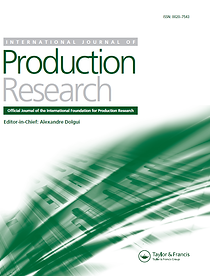

International Journal of Production Research
AI-Enabled Evolution: Unveiling the Synergy between Manufacturing and Services through Coordination and Integration
Submission Deadline:
February 29th 2024
Aims & Scope
Rapid advancements in artificial intelligence (AI) are provoking evolutions in the manufacturing and services sectors. By leveraging on the promise of AI-based technologies, firms are eager to exploit synergistic opportunities (Chien et al., 2020; de Giovanni, 2021; Khosrowabadi et al., 2022; Sharma et al., 2022; Xu et al., 2023; Castane et al., 2023). These synergies can overcome challenges associated with supply chain disruption while creating opportunities for mass customization. However, taking full advantage of such opportunities necessitates deep and integrated coordination between functional groups (particularly operations, marketing, finance, and R&D), and with their partners such as suppliers and distributors, etc.
While AI-based technologies have been increasingly explored (Chatterjee et al., 2021; Dora et al., 2022), we still do not observe the underlying mechanisms of how firms and supply chains are optimized because of reducing friction between manufacturing and service operations brought together by two or more functional groups owing to AI evolution. This convergence between functional groups due to AI-enabled evolution allows the conversion of traditionally perceived challenges into opportunities in ways that were previously unimaginable. This special issue aims to attract novel research exploring how AI-enabled evolution in the intersection of manufacturing and services can enhance performance within firms or across supply chains, particularly through coordination and integration.
Topics of Interest
Submissions to this special issue can be theoretical, methodological, computational, or application-oriented. Empirical papers and reviews are also welcome if they deepen our understanding of the complex interplay between AI, manufacturing, and services. Topics include, but are not limited to:
-
New theories and methods on the synergy between manufacturing and services under the new generation of AI-based technology.
-
Novel decision architectures and paradigms for AI-based manufacturing and service operations management.
-
Combination of AI-based technologies, such as machine learning, with classical operations research techniques for manufacturing and service ecosystems.
-
Combination of digital servitization and manufacturing based on new-generation information technologies such as the Internet of Things, big data, and cloud computing.
-
Collaborative operation optimization of manufacturing and services.
-
AI-based applications in logistics and intelligent transport systems.
-
Empirical research on the servitization of manufacturing under AI-enabled evolution.
-
Market-oriented manufacturing model exploration and AI-led technological innovation.
-
Risk control and management with AI as an enabler in supply chain management.
-
Enterprise sustainability and the strategic implications of AI-enabled evolution.
Special Issue Editors:
-
Feng Chu, Laboratory IBISC, Univeristy of Evry Val d’Essonne, France; feng.chu@univ-evry.fr
-
Alexandre Dolgui, IMT Atlantique, LS2N- CNRS, France; alexandre.dolgui@imt-atlantique.fr
-
Joshua Ignatius, Aston Business School, Birmingham, UK; j.ignatius@aston.ac.uk
-
Jayanth Jayaram, University of Oklahoma, USA; jjayaram@ou.edu
-
Dujuan Wang, Business School, Sichuan University, China; djwang@scu.edu.cn
-
Yunqiang Yin, School of Management and Economics, University of Electronic Science and Technology of China, Chengdu, China; yinyq@uestc.edu.cn
Contact:
Yunqiang Yin (Managing Guest Editor), yinyq@uestc.edu.cn
References
Castañé, G., Dolgui, A., Kousi, N., Meyers, B., Thevenin, S., Vyhmeister E., & Östberg, P-O. (2023) The ASSISTANT project: AI for high level decisions in manufacturing. International Journal of Production Research, 61(7), 2288-2306.
Chatterjee, S., Rana, N. P., Dwivedi, Y. K., & Baabdullah, A. M. (2021). Understanding AI adoption in manufacturing and production firms using an integrated TAM-TOE model. Technological Forecasting and Social Change, 170, 120880.
Chien, C. F., Dauzère-Pérès, S., Huh, W. T., Jang, Y. J., & Morrison, J. R. (2020). Artificial intelligence in manufacturing and logistics systems: algorithms, applications, and case studies. International Journal of Production Research, 58(9), 2730-2731.
De Giovanni, P. (2021). Smart Supply Chains with vendor managed inventory, coordination, and environmental performance. European Journal of Operational Research, 292(2), 515-531.
Dora, M., Kumar, A., Mangla, S. K., Pant, A., & Kamal, M. M. (2022). Critical success factors influencing artificial intelligence adoption in food supply chains. International Journal of Production Research, 60(14), 4621-4640.
Khosrowabadi, N., Hoberg, K., & Imdahl, C. (2022). Evaluating human behaviour in response to AI recommendations for judgemental forecasting. European Journal of Operational Research, 303(3), 1151-1167.
Sharma, R., Shishodia, A., Gunasekaran, A., Min, H., & Munim, Z. H. (2022). The role of artificial intelligence in supply chain management: mapping the territory. International Journal of Production Research, 60(24), 7527-7550.
Xu, X., Hong, Z., Chen, Y., & Cheng, T. C. E. (2023). When is it wise to use artificial intelligence for platform operations considering consumer returns? European Journal of Operational Research, 308(3), 1188-1205.